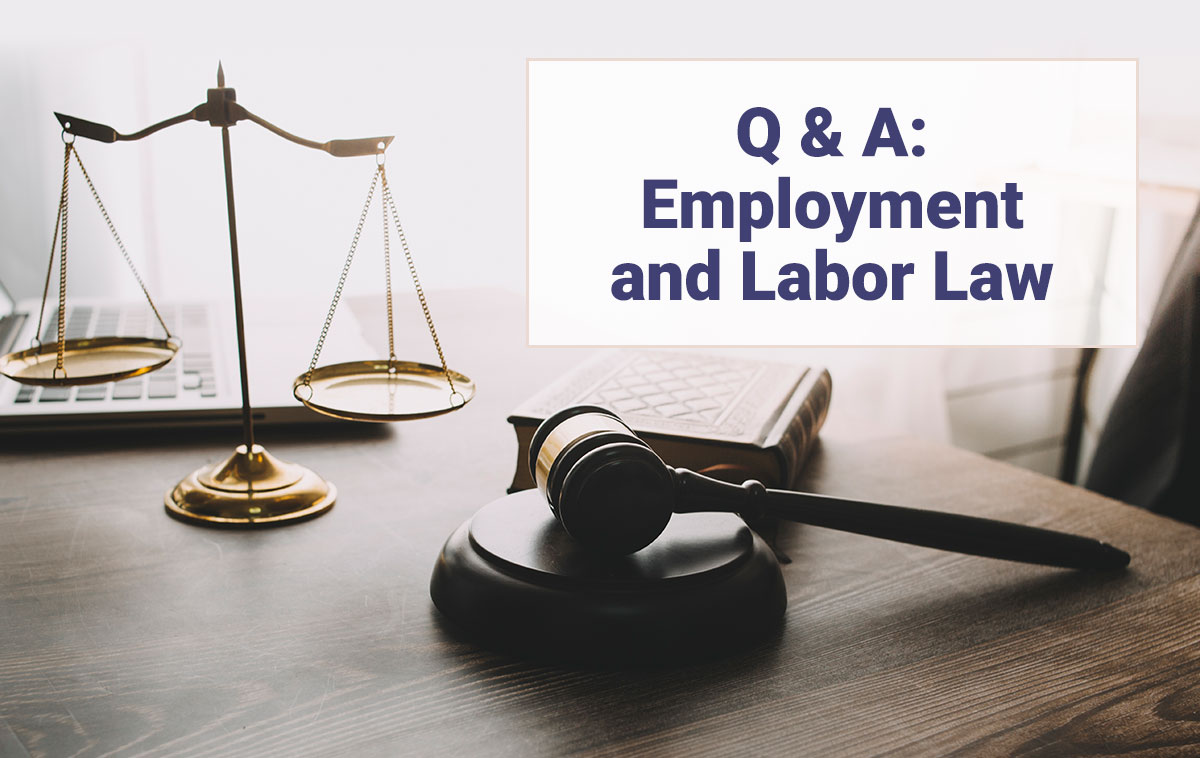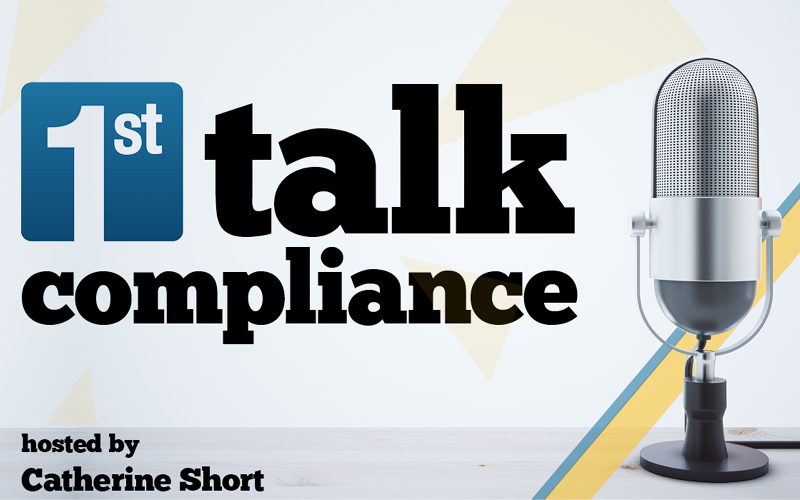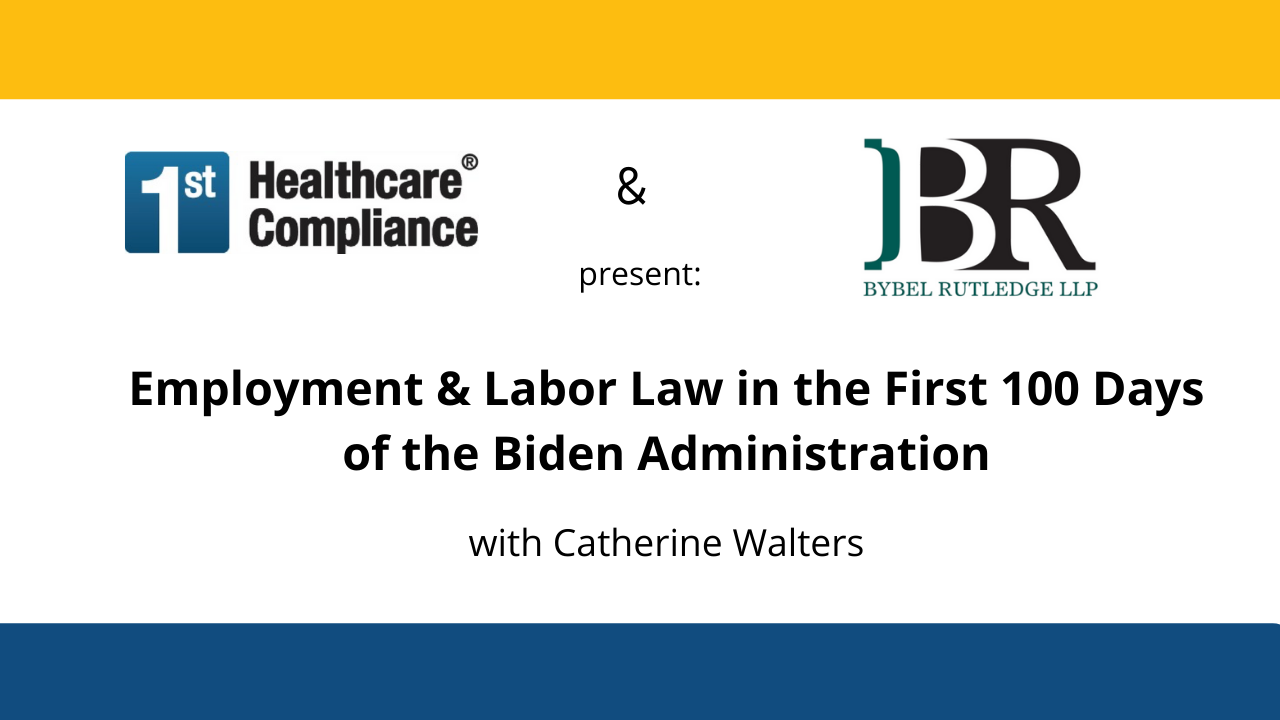Q & A: Employment and Labor Law

 Catherine Walters, Partner at Bybel Rutledge LLP, is a management side labor and employment attorney representing employers of all sizes. As a member of the First Healthcare Compliance editorial council, Catherine is a frequent presenter at educational events. For more information regarding this topic please view a related webinar and listen to an episode of 1st Talk Compliance for further discussion and learning.
Catherine Walters, Partner at Bybel Rutledge LLP, is a management side labor and employment attorney representing employers of all sizes. As a member of the First Healthcare Compliance editorial council, Catherine is a frequent presenter at educational events. For more information regarding this topic please view a related webinar and listen to an episode of 1st Talk Compliance for further discussion and learning.
Below Catherine answers some common questions and provides explanations of a few timely topics related to employment and labor law.
Could you explain what the OFCCP is and discuss the related issues?
The OFCCP means Office of Federal Contract Compliance Programs. It’s basically considered to be the federal watchdog with respect to federal contractors who receive federal monies to perform work or provide products. The OFCCP enforces a number of laws as to employers. Primarily it enforces Executive Order 11246, which requires affirmative action on behalf of minorities and females. Then there’s the Rehabilitation Act, Section 504 of the Rehabilitation Act, which requires employers to provide affirmative action and equal opportunity to individuals with disabilities. There’s also the Vietnam Veterans, VEVRAA. OFCCP enforces the Vietnam Veterans law as well, and it requires affirmative action on behalf of protected veterans. It’s not just Vietnam veterans at this point, affirmative action is typically applicable to federal contractors with varying sizes of federal contracts, and numbers of employees 50 or more employees, and you must have a written plan. What we see on an annual basis is employers who must update their affirmative action plans. Annually, a federal contractor will update those plans. The OFCCP is the one that not only monitors those plans but accepts charges of discrimination and investigates those. They’re really focused on discrimination and much of their focus is on systemic discrimination, as opposed to individual discriminations. What you’ll have in many situations is what we call disparate treatment versus disparate impact. Disparate treatment is where you treat one person differently from another or one group or class of employees differently from another.
What are the new SAM requirements?
SAM, is the System for Award Management database. Federal contractors must sign up with that portal to qualify for government contracts. This has never happened in the past, but we have a new affirmative action plan reporting requirement that will go into effect. In essence, under the SAM declarations page, contractors are going to have to begin affirming that they have developed and maintained affirmative action programs at each establishment as applicable. This was where the OFCCP lacked teeth. In many instances, in the past, employers were able to get away with not having their programs in place or updating their plans on a regular basis. A lot of contractors think they have an affirmative action plan and it’s in some dusty binder on some dusty shelf in some closet somewhere. It’s an annual exercise and it must be done at least annually and be done even more regularly. You can have short plans, but you can’t have a plan that goes beyond 12 months. This will require people to give more thought to making these certifications, because to make a certification is very important. Under SAM, if you lie about it, you could be disbarred.
Can you explain briefly about restrictive covenants?
Restrictive Covenants include things like non-competition agreements, non-solicitation agreements, non-interference, and non-contact and so forth. Typically, employers use them to prevent valued employees from leaving them and going and competing with them at another workplace. In recent years, we’ve seen a lessening of the use of the noncompetition restriction, meaning that that person can go work somewhere else, but still, a use of non-solicitation, meaning that even though you can go to a competitor, you may not solicit clients or other customers that you had when you worked for me, and you can’t reach out to our employees and ask them to come with you. Basically, you can’t interfere with my relationships that I had, either before you were here, or while you were here, and you can’t do it for a year or two. Of course, that dovetails with confidentiality agreements, and the protection of confidential information and trade secrets for employers. With respect to restrictive covenants, some states in the United States have legislation against restrictive covenants in the employment field. It’s clear that restrictive covenants prevent employees from moving around, and this inability to move around or go to a competing employer prevents them from increasing wages and benefits as quickly as they might otherwise be able to do and it prevents them from growing in their careers in many cases. Restrictive covenants, while they’re legislated in many states, they aren’t legislated in others. So, there’s no consistent legislation about restrictive covenants in the United States. Some states, you can use them to your heart’s content, other states you can use them in very limited fashion, and in other states, they’re prohibited.
Is remote work here to stay?
In a word, yes. At least for employers who can accommodate remote work. There are a lot of employers that can’t accommodate remote work. And then of course, there’s the hybrid type where some workers must be in person and others can be remote. Some of the big issues really are about adapting your employment processes to this new normal. Issues such as recruiting, interviewing, onboarding, and measuring performance are all impacted by the change to remote work.
Do you have advice for employers working through challenges of today’s working environment?
It’s not about where people work. It’s what they do. And that’s kind of the new normal, where they work what they do, and productivity is the key.






